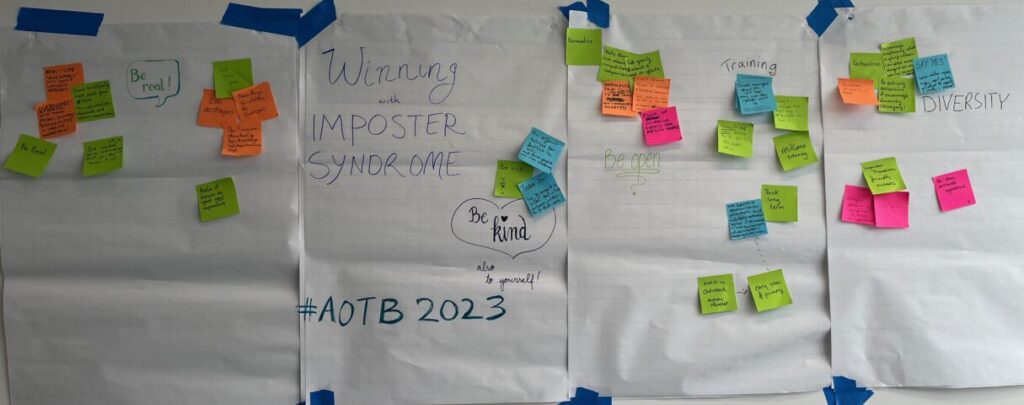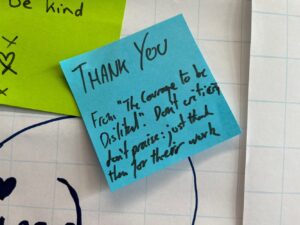This is a joint post mostly written by Veerle!
Last November, Veerle Verhagen and I delivered a workshop on Imposter syndrome at Agile Testing Days in Potsdam together. The participants came up with excellent ideas to fight imposter syndrome, which we shared in a blog post. The responses to that session were so overwhelmingly positive, that we decided to do a repeat session. We were accepted to run this workshop again at Agile on the Beach in Falmouth this July. Once again it was a very interesting session and once again, we’re sharing the results with the community.
A new approach for Agile on the Beach
We decided to change a few things after the first session. In our session, we had wanted to drive home the idea that imposter syndrome is not an individual problem, but an industry-wide one that should be addressed as such. In our first run we hadn’t quite put enough emphasis on this. This meant that a lot of the ideas generated were still aimed towards people suffering from feelings of being an imposter to help themselves, rather than community-driven culture changes that might help people from ever developing these feelings.
This time round, we focused more on the community-driven aspect and it shows in the output. Another thing we’re still working on is the title of the workshop. Imposter syndrome implies a pathology, something that a patient suffers from and is all in their mind. We’re trying to rephrase it, by referring to ‘imposter feelings’ of ‘imposter phenomenon’, but it’s tricky to get the terminology straight. We like to believe this is something that another run of the workshop could work out!
Solving the root problems
The one idea generated in this session that really stood out, and that was vastly different from the results from our previous session, was that we’re not actually asking the right question. Ilja Vishnevski challenged us by saying the industry cannot solve this problem, so where do we look next?
The proposed solution to this was moving to a longer term approach. Instead of trying to solve this now, we should be looking to solve this at the root. That means investing in outreach (time and/or money; volunteering and/or donating), creating opportunities in tech for young people. If they feel confident in tech from an early age, this might help them feel more confident in and deserving of tech jobs at a later age.
Diversity also plays a huge role in this, and, we feel, suffers from similar issues; increasing diversity right now is tricky and requires a longer term approach in order to be solved durably. Interestingly, at AotB, an opportunity to contribute presented itself in TecWomen. This organisation aims to help women get jobs in tech. Their junior program, TecGirls, aims to do the same for girls and children in general. They’re always looking for donations so if you feel so inclined, head on over to their website!

Shorter-term solution ideas
Some shorter-term solutions that we might apply right now were also proposed. A topic that came up last session and again this one, is openness. We can all set an example by being open about where our knowledge ends; when we don’t know something, we can all just say so. This has the potential to become a cultural movement: once enough people do this, we’re really normalising not knowing everything. This could possibly help people who feel that their own lack of knowledge is a sign of their complete incompetence. It might also help against false comparisons, where we feel everyone else knows much more than we do.
Attendees also suggested opening up about imposter syndrome. Rather than letting people suffer in silence, let’s talk about it. This could open the way for people to become more aware of the feeling in others. Managers could become more equipped to deal with this issuer in their teams, and similarly team mates could offer each other mutual support.
One last thing that everyone could be doing to help mitigate imposter feelings in everyone, is by communicating more clearly and not assuming levels of knowledge. Part of the embarrassment and personal failure we feel when not knowing something, comes from the idea that other people do have this knowledge and we do not, therefore rendering us inferior, less equipped, and not up to the job. By doing away with unnecessary acronyms and trying to speak in a way that everyone can follow, we make our communication more inclusive and more forgiving.
A good way to give feedback and appreciation
Sophie Kuester, our resident expert on imposter phenomenon, did a wonderful talk earlier in the day, The imposter’s guide to tooting your own horn!” (Here’s a link to the same talk which she did for an Agile Testing Days webinar recently.) She shared an interesting insight during the workshop about what triggers feelings of being an imposter for her: being praised. When someone expresses admiration or appreciation for her, she said, it feels undeserved, and like it is an impossible task to live up to the expectations that this compliment seems to have set.
 This prompted ideas for a change in how we deliver feedback and compliments. One person suggested, rather than praising or criticising colleagues or employees, we might change to just thanking them for their work. Hereby we normalise appreciating the time and effort people put in, without directly linking that appreciation to skill or performance. The focus shifts from the individual, to the individual’s contribution.
This prompted ideas for a change in how we deliver feedback and compliments. One person suggested, rather than praising or criticising colleagues or employees, we might change to just thanking them for their work. Hereby we normalise appreciating the time and effort people put in, without directly linking that appreciation to skill or performance. The focus shifts from the individual, to the individual’s contribution.
One last thing that we added to the session, was to ask participants one important question at the end: what are taking away from this session? Name just one thing that you’re going to change after today. So what are you going to do differently after reading this? Let us know!



3 comments on “Winning With Imposter Syndrome: A Community Effort”
‘Tine Zekis gave a great presentation at Agile 2023 on “Imposter Systems” that you might find interesting. There’s a recording of her giving the talk at another event at https://youtu.be/Ak50ObUjNj8
Thank you, Allison!
[…] Veerle Verhagen and I were so happy that Sophie joined our workshop, “Winning with Imposter Syndrome”, that afternoon. Veerle wrote up the outcomes from our excellent participants which you can read in this post. […]